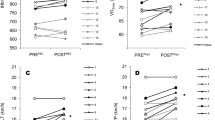Abstract
Elite distance runners participated in one of two studies designed to investigate the effects of moderate altitude training (inspiratory partial pressure of oxygen ≈115–125 mmHg) on submaximal, maximal and supramaximal exercise performance following return to sea-level. Study 1 (New Mexico, USA) involved 14 subjects who were assigned to a 4-week altitude training camp (1500–2000 m) whilst 9 performance-matched subjects continued with an identical training programme at sea-level (CON). Ten EXP subjects who trained at 1640 m and 19 CON subjects also participated in study 2 (Krugersdorp, South Africa). Selected metabolic and cardiorespiratory parameters were determined with the subjects at rest and during exercise 21 days prior to (PRE) and 10 and 20 days following their return to sea-level (POST). Whole blood lactate decreased by 23% (P < 0.05 vs PRE) during submaximal exercise in the EXP group only after 20 days at sea-level (study 1). However, the lactate threshold and other measures of running economy remained unchanged. Similarly, supramaximal performance during a standardised track session did not change. Study 2 demonstrated that hypoxia per se did not alter performance. In contrast, in the EXP group supramaximal running velocity decreased by 2% (P < 0.05) after 20 days at sea-level. Both studies were characterised by a 50% increase in the frequency of upper respiratory and gastrointestinal tract infections during the altitude sojourns, and two male subjects were diagnosed with infectious mononucleosis following their return to sea-level (study 1). Group mean plasma glutamine concentrations at rest decreased by 19% or 143 (74) μM (P < 0.001) after 3 weeks at altitude, which may have been implicated in the increased incidence of infectious illness.
Similar content being viewed by others
Author information
Authors and Affiliations
Additional information
Accepted: 19 March 1998
Rights and permissions
About this article
Cite this article
Bailey, D., Davies, B., Romer, L. et al. Implications of moderate altitude training for sea-level endurance in elite distance runners. Eur J Appl Physiol 78, 360–368 (1998). https://doi.org/10.1007/s004210050432
Issue Date:
DOI: https://doi.org/10.1007/s004210050432




